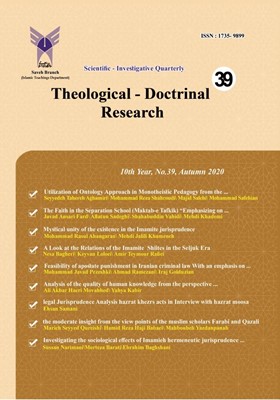-
-
List of Articles
-
Open Access Article
1 - Utilization of Ontology Approach in Monotheistic Pedagogy from the Holy Qurans point of View
Seyyedeh Tahereh Aghamiri Mohammad Reza Shahroodi Majid Salehi Mohammad Safehian -
Open Access Article
2 - The Faith in the Separation School (Maktab-e Tafkik) “Emphasizing on Maleki Mianaji's views”
Javad Ansari Fard aflatoon sadeghi shahabboddin vahidi mahdi khadmi -
Open Access Article
3 - Mystical unity of the existence in the Imamite jurisprudence
Mohammad Rasul Ahangaran ss dd -
Open Access Article
4 - A Look at the Relations of the Imamite Shiites in the Seljuk Era
nesa bagheri -
Open Access Article
5 - Feasibility of apostate punishment in Iranian criminal law With an emphasis on narrative and doctrinal teachings
ahmad ramezani -
Open Access Article
6 - Analysis of the quality of human knowledge from the perspective of Mirza Javad Tehrani
Ali Akbar Haeri Movahhed yahya Kabir -
Open Access Article
7 - legal Jurisprudence Analysis hazrat khezrs acts in Interview with hazrat moosa
Ehsan Samani -
Open Access Article
8 - the moderate insight from the view points of the muslim scholars Farabi and Qazali
Hamidreza Hajibabaeei Mahboubeh Yazdanpanah -
Open Access Article
9 - Investigating the sociological effects of Imamieh hermeneutic jurisprudence with Emphasis on Imam Khomeini's Thoughts
Sussan Narimani Morteza Barati Ebrahim Baghshani
-
The rights to this website are owned by the Raimag Press Management System.
Copyright © 2017-2026







